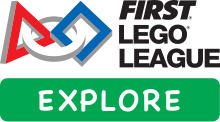| Year | Theme | Number of Participants | Number of Teams | Number of Events | Notes |
|---|
| 2004-2005 | No Limits | 375+ | 125 | 9 | The first pilot year. The challenge was to find ways to improve access for people with different physical abilities. |
| 2005-2006 | Ocean Odyssey | 981+ | 327 | 27 | The second pilot year. The topic was related to learning about habitat of marine life |
| 2006-2007 | Nano Quest | 3,500+ [12] | 702 [12] | 30 | The third pilot year. The challenge provided an opportunity for children to learn about the scale of nanometer. |
| 2007-2008 | Power Puzzle | 6,000+ | 1,004 [13] | 40+ | Official launch. The challenge was on energy. Children needed to perform an energy audit and seek answers about the source of energy for everyday appliances. |
| 2008-2009 | Climate Connections | 7,000+ | 1,203 [14] | 40+ [14] | Learn about tools used to study climate. |
| 2009-2010 | Smart Move | | 1,448 [15] | | Relaunched as a robotics program. The first year to expand globally. The topic is about Transportation. [16] |
| 2010-2011 | Body Forward | | 2,100+ [17] | | Biomedical Engineering [18] |
| 2011-2012 | Snack Attack | 18,000 [19] | 2,985 [19] | 90+ [19] | Food safety [20] |
| 2012-2013 | Super Seniors | 20,000 (est.) [21] | 3,347 [21] | 100+ [21] | Improve the quality of life for seniors [22] |
| 2013-2014 | Disaster Blaster | 24,000+ [23] | 4,000+ [23] | 100+ [23] | Help master natural disasters [24] |
| 2014-2015 | Think Tank | 34,000 (est.) [25] | 5,653 [25] | 250 [25] | There's always something new to learn [26] |
| 2015-2016 | Waste Wise | 48,000 (est.) [27] | 8,031 [27] | 300+ [27] | Prepare to become Waste Wise! [28] |
| 2016-2017 | Creature Craze | 64,000 (est.) [29] | 10,655 [29] | 400+ [29] | About animals and the animal kingdom [30] |
| 2017-2018 | Aqua Adventure | 99,000 (est.) [31] | 16,425 [31] | 450+ [31] | Water use and water's journey [32] |
| 2018-2019 | Mission Moon | 130,300 [33] | 21,718 [33] | 984 [33] | Building a Moon base and living on the Moon [34] |
| 2019-2020 | Boomtown Build | 163,000+ [35] | 21,703 [36] [35] | | Explore the needs of a community and design a building for the town. [37] |
| 2020-2021 | Playmakers | 67,872 [38] | | | Improve the games and place spaces of tomorrow. [39] |
| 2021-2022 | Cargo Connect | 115,600+ [40] | | | First year since 2010 that had the same game name as FIRST Lego League Challenge. Explore how cargo is transported, sorted, and distributed. [41] |
| 2022-2023 | Superpowered | 156,500+ [42] | | | Teams will explore where energy comes from and how it is distributed, stored, and used. |
| 2023-2024 | Masterpiece | | | | Teams explore the intersection of STEM and creativity. |
| 2024-2025 | Submerged | | | | Teams explore the layers of the ocean and bring their learnings and ideas to the surface as they “sea” into the future. [43] |


